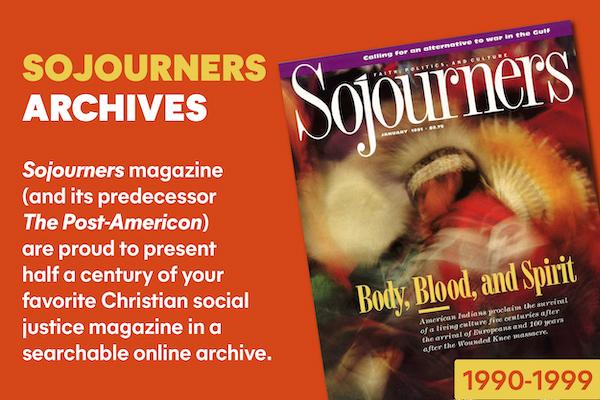On our Sojourners Community retreat this fall, the retreat leader asked each of us to describe something that brings us joy. I tried to think of something that had some theological or political significance, but couldn't get rid of the first thing that jumped into my head.
My mind had immediately conjured up the vivid picture of 6'9" point guard/forward/center Magic Johnson taking a rebound off the boards and leading the Lakers down the floor in a patented Los Angeles fast break. At the last second, the gentle giant with the famous smile dishes a no-look pass to a teammate, who finishes with a thunderous slam dunk. The crowd goes wild, but nobody is happier than Magic, who reacts with the glee of a kid accomplishing it for the first time.
I shared with the group that watching Magic Johnson play basketball over these last 12 years has been an unending source of delight. I tried to justify it by saying that I, like Magic, am from Michigan State University, and by pointing out how rare it is for a superstar to prefer the perfect pass to the scoring limelight. (Could the Bible's "servant leader" be a point guard?)
Five days later, Earvin "Magic" Johnson announced to the world that he had contracted the HIV virus that leads to AIDS and was retiring from basketball.
For millions of people (and I'm one of them), Magic has been, as one sportswriter recently put it, "an apostle of joy." Despite the blatant commercialism and contradictions of big-time professional sports, and the painful but not surprising revelations about his own lifestyle, there can be no denying that Magic Johnson brought something very unique and special to the game that he so loves.
Magic didn't just win over his opponents, he won them over--to his friendship, to the causes he cared so much about (such as the United Negro College Fund), and to a higher level of play and sportsmanship. He brought out the very best in his teammates, and even his chief adversaries on the court were transformed into his closest friends. Larry Bird, Magic's greatest rival, said after the tragic announcement, "Whenever I'm around him, I become happier." That spoke for many of us--basketball fans and non-fans, the press corps who covered him, the janitors who cleaned up The Forum after the games and, of course, those who are young, black, Hispanic, and poor for whom Magic has become such a special hero.
THE KEY TO understanding the "magic" of Earvin Johnson is best symbolized by the amazing passes that gave him all those assists--he made everyone else better. Magic Johnson has now been given the opportunity to do that again--to make the rest of us better--on a much higher court than he has ever played on before.
In the remarkably honest article he wrote for Sports Illustrated, Magic said, "Sure, I was convinced that I would never catch the AIDS virus, but if it was going to happen to someone, I'm actually glad it happened to me. I think I can spread the message concerning AIDS better than almost anyone."
As he admitted in the same article, Earvin Johnson must begin by educating himself. We should hope that he will begin to understand the depth of the tragedy of AIDS, which has already killed 125,000 people--people who were mostly abandoned by their society instead of being internationally acclaimed for their courage as he has been. We can hope that his own infection will create a deep identification with the million more people who have contracted the virus and whose lives depend on this nation finally devoting its attention and resources to finding a cure.
We need him to resist the temptation, as a married heterosexual and virile athlete, to set himself apart from others with AIDS--and help this country break through the wall of stereotypes and blame that prevents the nation from really caring when those afflicted are homosexuals or intravenous drug users.
We can hope now that Earvin Johnson will realize that if he were not Magic and had gotten the AIDS virus, he might well be like other black and poor sufferers who wait months for any medical diagnosis or treatment, are unable to afford the expensive drugs that would prolong their lives, and eventually experience miserable and lonely deaths without health care, respect, or simple compassion. We can hope he takes that message to the White House.
Finally, we must hope that Magic will come to see that his message of "safe sex" doesn't go nearly far enough. Convincing 15-year-old boys to use condoms when they have sex with 13-year-old girls will not get to the heart of this society's utter abuse of sexuality and the disastrous consequences. Neither will merely blaming the kids--or having vice presidents offer hypocritical sermons on abstinence--solve the problem when the whole consumer society literally sells sex, uses sex to sell everything else, and virtually imposes destructive promiscuity on the young.
Earvin Johnson now admits his massive participation in that empty ethic of making sex a commodity. We can hope he comes to realize, along with millions of young people, that the only choice is not between "safe" or unprotected sex.
The truth this society must begin to talk about is that, even apart from the national epidemic of sexually transmitted disease, sex is not "safe" for the human spirit when it is separated from relationship, intimacy, and commitment. And whether Magic Johnson starts talking about that or not, it's about time that the rest of us do, especially in the religious community.
I will miss Magic on the basketball court more than I can say. His joyful dance up and down the floor certainly made my life better. After meeting every challenge ever presented to him, he now faces the greatest one of all. Make us better again, Magic.
Jim Wallis is editor-in-chief of Sojourners.

Got something to say about what you're reading? We value your feedback!
